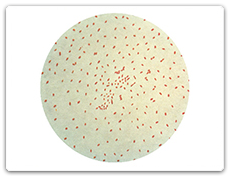Pertussis (Bordetella pertussis)
 Pertussis is a highly infectious disease that is caused by the bacteria Bordetella pertussis. It is more commonly known as “whooping cough.” This common name is derived from the most noticeable symptom of this infection, which includes severe spells of cough followed by a “whoop” sound before the next breath. It is the second most reported vaccine-preventable disease in Canada. Although it can affect individuals of any age, the severity is greatest among young infants.
Pertussis is a highly infectious disease that is caused by the bacteria Bordetella pertussis. It is more commonly known as “whooping cough.” This common name is derived from the most noticeable symptom of this infection, which includes severe spells of cough followed by a “whoop” sound before the next breath. It is the second most reported vaccine-preventable disease in Canada. Although it can affect individuals of any age, the severity is greatest among young infants.
Image Content Provider: CDC Public Health Image Library
Symptoms
Symptoms generally appear between 7 to 10 days after being exposed to the germ and may be delayed for up to 20 days. Pertussis infection can cause symptoms similar to those of the common cold. These include a runny nose, red watery eyes, mild fever and cough. The cough may worsen until the infected individual experiences severe coughing spells followed by a "whoop" sound before the next breath. This cough can last 6 to 12 weeks. The whooping is more common in young children than in adolescents and adults.
Causes
Pertussis is a highly infectious disease that is caused by the bacteria Bordetella pertussis, which is commonly spread through respiratory droplets in the air formed when coughing or sneezing. Infected individuals who remain untreated and living in the same household are the most common sources of infection of infants.
Pertussis is most contagious during the initial stages of illness. During this time, symptoms resemble those of the common cold. This period usually lasts up to two weeks. The contagiousness of pertussis declines quickly afterwards, but it may last up to three weeks.
Treatment
An individual infected with pertussis may be prescribed antibiotics. An infected person should stay home and avoid close contact with others until treatment is completed.
Prevention
The best way to protect yourself and your loved ones against pertussis is through immunization. Manitoba has a provincial immunization program, which provides free, publicly-funded vaccines to those who are eligible.
Individuals who are already infected should receive treatment and avoid close contact with young children to prevent spreading their infection. Other precautions include practicing good hand hygiene and covering your nose and mouth when you cough or sneeze.
Manitoba Health Resources
For the Public
- Grades 8/9 School Immunization Program – Factsheet for Parents & Guardians

(August 2021) - Tetanus, Diphtheria and acellular Pertussis (Tdap) Vaccine

(January 2019) - Tetanus, Diphtheria, Pertussis, Polio (Tdap-IPV) Vaccine

(August 2016) - The 5-in-1 Vaccine (DTaP-IPV-Hib)

(July 2010)
For Health Care Providers
- Pertussis Protocol
September 2024 NEW - Immunization Program Manual for Immunization Providers in Manitoba
- Manitoba's School Immunization Program – Questions & Answers for Health Care Providers

(August 2021)
Other Resources
Communicable Disease
Control (CDC) Health Links – Info Santé |


